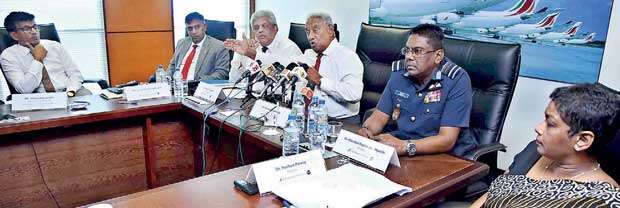Reply To:
Name - Reply Comment

From left: National Public Private Partnership Agency Chairman Thilan Wijesinghe, SriLankan Directors Susantha Katugampala, Mano Tittawella, Ranjit Fernando (Chairman), Air Marshal Kapila Jayampathi and Dr.Roshan Perara
Pic by Samantha Perera
By Chandeepa Wettasinghe
The national carrier, SriLankan Airlines, which is running at massive losses, is hoping to return to profitability in three years according to the new director board, which was appointed this week following the resignation of the previous directors.
“In 2-3 years, we hope to make it into a profitable entity. Based on our experience in management, it’s a challenge, but we’re hoping to meet the challenge and succeed,” SriLankan Airlines Chairman Ranjit Fernando, a former banker told reporters in Colombo yesterday.
Speaking at the first media briefing held at the airline headquarters following the board change, he said the airline had incurred a loss of US$ 100 million for the2016/17 financial year, which ended last week. Higher oil prices had contributed to the poor performance.
“The budgeted loss for this year is between US$ 140-160 million, which is unacceptable,” Fernando added.
However, a restructuring plan has been submitted by the airline consultants Nyras, and the board is evaluating the proposals which could begin implementation within the next two months, according to Fernando.
He said that he cannot specify by how much the loss could be cut down this year if the restructuring plan is implemented.
SriLankan Director Mano Tittawella, who is currently an advisor to the Finance Ministry and the Treasury—the airline’s main shareholder—said SriLankan would for now focus itself on becoming profitable instead of searching for a strategic partner like it did over the last two years.
“We’re not at that stage, but we will study when to go for a strategic partnership,” he said.
The restructuring will take into account every facet of the company, including finance, human resources, aircraft and routes.
With US$ 750 million in debt guaranteed by the Treasury and US$ 400 million in negative net worth, Tittawella said that the Treasury is willing to invest in SriLankan and ease the debt burden if the airline can deliver mid to long term returns.
“We will have to determine what sort of Treasury support will be given,” he said, stopping short of explaining the issue in greater detail, while also failing to outline the Treasury’s contingency plan, despite boasting that it has one in case the restructuring fails.
Fernando meanwhile added that the 7,000 strong work force may have to be downsized to 5,000.
“With 7,000 staff, the airline is terribly overstaffed. With 2,000 excess people, you can’t run a profitable airline,” he said, noting that lengthy discussions, humane treatment and attractive severance packages would be extended in order to persuade the powerful trade unions to agree with these hard choices.
He said that the new board, which has no airline management experience, would depend on consultants and the top management to help steer the airline in the right direction, and if the top management cannot meet the targets set by the board, it would replace them.
Many in the management have been with the airline from 2008 to 2014, when SriLankan was transformed from a profitable venture to one of the public’s biggest burdens.
Fernando also explained that according to the consultants, most of SriLankan’s aircraft have been purchased or leased at much higher prices than the market prices, and that continuing payments to the lessors and sellers only serves to provide them with super profits.
“It would have been fine if the difference was one or two percent. We have paid much more than 20 percent of the market price,” he said, pledging to renegotiate all such contracts.
Fernando further added that many of the wide-bodied aircraft in the fleet are not suited for the routes currently in operation which could be plied at lower cost with narrow-bodied aircraft.
A US$ 720 million contract with Airbus to acquire four Airbus A350 is currently close to being cancelled at no cost to the airline, according to National Public Private Partnership Agency Chairman Thilan Wijesinghe, who was also present at the media briefing yesterday.
The lease of four similar aircraft was cancelled recently at a cost of US$ 115 million to the airline. Both these contracts were signed in 2014.
Meanwhile, decisions taken by the previous board such as making SriLankan into a regional airline will also be revisited during the restructuring, Fernando said.
He said that past action of employees, top management and former directors which had contributed to the airline’s downfall would not be looked into by the new board, but left for the Presidential Commission set up for this purpose by the President.